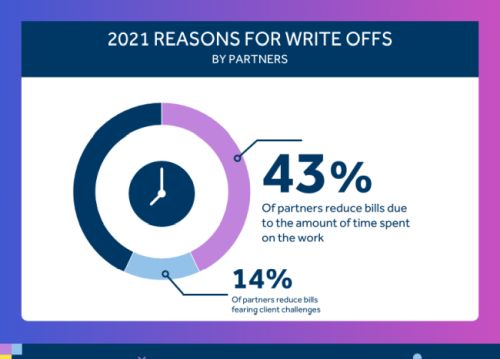Virtually every tax professional uses at least one of the dominant case law search engines, commercial or open-source, to find supporting authority for the position their client is taking (whether in controversy or for tax planning purposes). All of these search engines operate with keywords. This can pose enormous challenges.
Broad keywords are required to ensure that no results are missed, yet the volume of results the case law search engine surfaces is often overwhelming, particularly if time is of the essence. And time usually is an important factor.
This can be particularly acute in the face of a court filing deadline. But even in the absence of such deadlines, the time spent researching must always be justified to the client. It can be a difficult conversation that follows a bill setting out eight hours of research with sparse results. It's no wonder then that time spent researching case law will often be written off, resulting in a concrete loss of revenue.
In fact, in Clio's 2021 Legal Trends Report, 43% of partners surveyed claimed that an excess of time spent on work was the main source of write-offs.

Partners in the study cited three primary reasons: a junior associate learning curve, an associate or staff member taking longer than expected to complete a task, and online legal research.
The report also looked at why partners don't report their own time worked. The number one reason is that they were researching a new or unfamiliar area of law.
To learn more about how lawyers are losing out on billable hours, check out our article here.
Efficiency and Exhaustiveness
It is a challenge to balance the need for finding all of the pertinent cases with the desire to keep case lists manageable.
This problem is exacerbated when the research task is conferred onto juniors, as is often the case, who are not deeply familiar with the legal topic in question. Having to formulate complex Boolean search terms that coax the right cases out of the vast amount of data, while not knowing the legal lingo the judge likely used to describe the issue, can put a junior in a very uncomfortable position.
Add the pressure of time, and uncomfortable becomes hardly bearable as the moment steadily approaches where a junior will have to walk up to a more experienced colleague and reveal that there are no cases that address the particular issue or not with the relevant factors being present.
This message is a difficult one to deliver and it is seldom appreciated, especially if it is preceded by the inevitable disclaimer "I think.". But the exhaustiveness of keyword searches is notoriously uncertain when there is limited time to go through the search results. There are then two issues that clearly surface when keyword searches are scrutinized: efficiency and exhaustiveness.
The researcher lacks the clairvoyant insight that is required to know exactly in which terms a judge would couch a legal issue, and to find the case that fits the fact pattern and outcome required. Consequently, the case law search will have to be over-inclusive to be exhaustive, which results in the tedious task of having to weed through countless duds.
These issues arise from the design of keyword search engines as the delivery method of data, rather than knowledge, requiring the researcher to structure the data, employing as the only other tool at their disposal their own imagination and educated guesses.
Hardly ideal.
If only there was a way to conduct case law research with a tool that pre-structured the data, organizing it by topic and surfacing the pertinent legal factors which form the basis of a court decision. Professionals could filter by outcome and every relevant factor that makes up the legal test the court employs to decide the matter.
Well, actually, there is.
Blue J's Decision Search
This is not wishful thinking anymore. Blue J has set out to bring absolute clarity to the law, everywhere and on demand. A key component of this goal is to rethink and redesign case law search. Here is what Blue J does differently from the dominant search engines.
Our tax experts research a legal topic, for example, the question whether an interest in a corporation is debt or equity. They gather and read through all the cases and IRS materials that have been decided on this matter, identify the ones with a substantive legal analysis and then structure this data in such a way that the researcher using this search method can filter by a plethora of factors. Examples of factors are:
- the outcome of the case,
- background factors such as the business or industry of the issuer,
- key terms of the obligation, e.g., what type of document is used to evidence the obligation,
- whether there was a fixed maturity date, whether an arm's-length rate of interest was specified,
- the relationship between the issuer and the holder,
- and many more!
For each filter that is applied, a visual breakdown of the outcome is provided which indicates which of the cases and IRS rulings, where the selected factor is present, fall on the side of debt or equity. This provides the user with immediate, rich insight into the legal landscape.
In this way, Blue J does not only deliver data, but knowledge, and eliminates the requirement of clairvoyant foresight in areas the researcher does not feel at home. The efficiency problem is obviously solved by this improved research method. All it takes is to select the legal topic and the factors that are of interest to the researcher.
But how about exhaustiveness?
Despite Blue J being a tech company, our legal research team is composed of real human beings that dedicate their time and efforts to collecting all the pertinent cases and IRS guidance on a legal question to build a truly helpful Decision Search. They apply their expertise to generate old-school keyword search terms and do the work to assess every data point the keyword search surfaces for its potential value for subsequent researchers of the topic at hand. And the key terms searches are run every week to make sure the most recent decisions are included as well. In this way, the user has a formidable starting point for their research, as Blue J facilitates but never replaces the expertise and care of the tax professional.
Today, thousands of tax practitioners use Blue J's Decision Search to uncover relevant case law and IRS guidance in a matter of minutes, rather than hours. Take a look at our platform to see for yourself how Blue J can speed up your research process.
The content of this article is intended to provide a general guide to the subject matter. Specialist advice should be sought about your specific circumstances.

